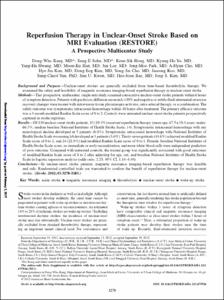Reperfusion Therapy in Unclear-Onset Stroke Based on MRI Evaluation (RESTORE) - A Prospective Multicenter Study
- Keimyung Author(s)
- Sohn, Sung Il; Lee, Jun
- Department
- Dept. of Neurology (신경과학)
- Journal Title
- Stroke
- Issued Date
- 2012
- Volume
- 43
- Issue
- 12
- Keyword
- acute stroke; magnetic resonance imaging; thrombolysis; unclear-onset stroke; wake-up stroke
- Abstract
- Background and Purpose: Unclear-onset strokes are generally excluded from time-based thrombolytic therapy. We examined the safety and feasibility of magnetic resonance imaging-based reperfusion therapy in unclear-onset stroke.
Methods: This prospective, multicenter, single-arm study screened consecutive unclear-onset stroke patients within 6 hours of symptom detection. Patients with perfusion-diffusion mismatch >20% and negative or subtle fluid-attenuated inversion recovery changes were treated with intravenous tissue plasminogen activator, intra-arterial therapy, or a combination. The safety outcome was symptomatic intracranial hemorrhage within 48 hours after treatment. The primary efficacy outcome was a 3-month modified Rankin Scale score of 0 to 2. Controls were untreated unclear-onset stroke patients prospectively captured in stroke registries.
Results: Of 430 unclear-onset stroke patients, 83 (19.3%) received reperfusion therapy (mean age, 67.5 ± 10.4 years; males, 66.3%; median baseline National Institutes of Health Stroke Scale, 14). Symptomatic intracranial hemorrhage with any neurological decline developed in 5 patients (6.0%). Symptomatic intracranial hemorrhage with National Institutes of Health Stroke Scale worsening ≥4 developed in 3 patients (3.6%). Thirty-seven patients (44.6%) achieved modified Rankin Scale score of 0 to 2, and 24 (28.9%) had modified Rankin Scale score of 0 to 1. Female, baseline National Institutes of Health Stroke Scale score, no immediate or early recanalization, and more white blood cells were independent predictors of poor outcome. Compared with untreated controls, the treated group was significantly associated with good outcomes of modified Rankin Scale score of 0 to 2 after adjusting for age, sex, and baseline National Institutes of Health Stroke Scale in logistic regression analysis (odds ratio, 2.25; 95% CI, 1.14–4.49).
Conclusions: In unclear-onset stroke patients, magnetic resonance imaging-based reperfusion therapy was feasible and safe. Randomized controlled trials are warranted to confirm the benefit of reperfusion therapy for unclear-onset stroke.
- Publisher
- School of Medicine
- Citation
- Dong-Wha Kang et al. (2012). Reperfusion Therapy in Unclear-Onset Stroke Based on MRI Evaluation (RESTORE) - A Prospective Multicenter Study. Stroke, 43(12), 3278–3283. doi: 10.1161/STROKEAHA.112.675926
- Type
- Article
- ISSN
- 0039-2499
- Appears in Collections:
- 1. School of Medicine (의과대학) > Dept. of Neurology (신경과학)
- 파일 목록
-
-
Download
 oak-aaa-4368.pdf
기타 데이터 / 954.58 kB / Adobe PDF
oak-aaa-4368.pdf
기타 데이터 / 954.58 kB / Adobe PDF
-
Items in Repository are protected by copyright, with all rights reserved, unless otherwise indicated.